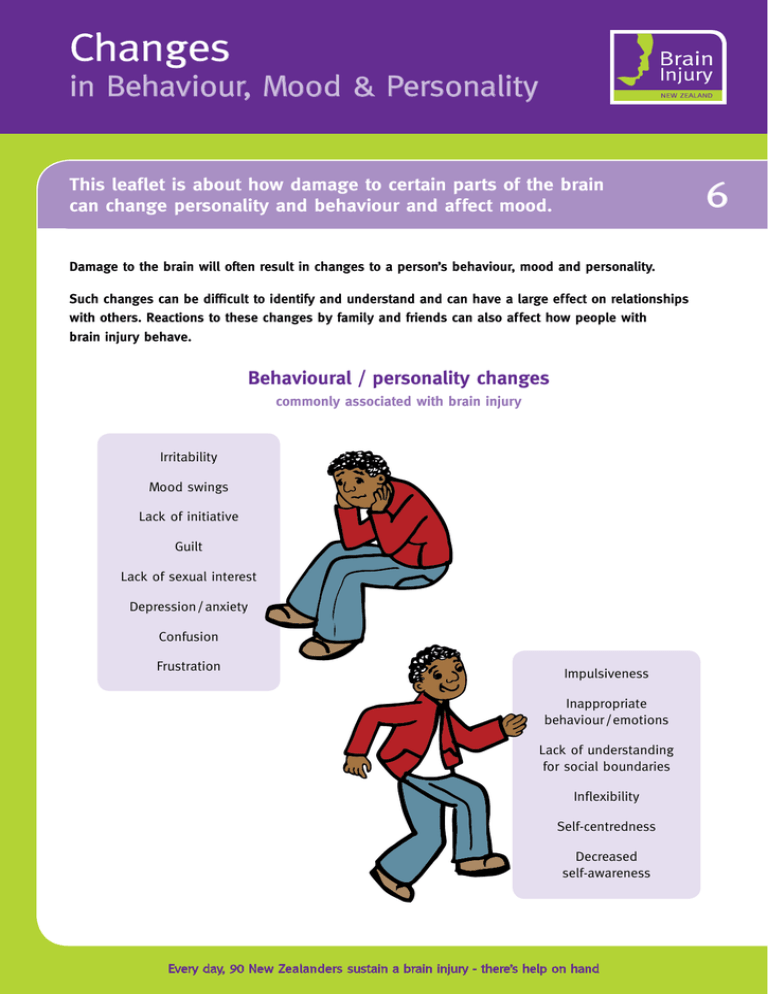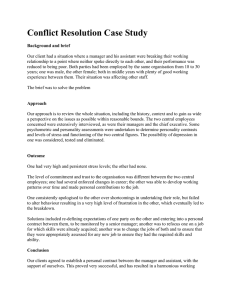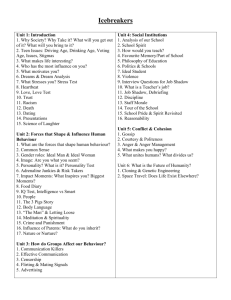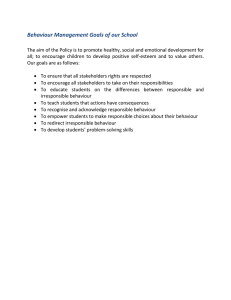Changes - The Brain Injury Association
advertisement

Changes in Behaviour, Mood & Personality This leaflet is about how damage to certain parts of the brain can change personality and behaviour and affect mood. Damage to the brain will often result in changes to a person’s behaviour, mood and personality. Such changes can be difficult to identify and understand and can have a large effect on relationships with others. Reactions to these changes by family and friends can also affect how people with brain injury behave. Behavioural / personality changes commonly associated with brain injury Irritability Mood swings Lack of initiative Guilt Lack of sexual interest Depression / anxiety Confusion Frustration Impulsiveness Inappropriate behaviour / emotions Lack of understanding for social boundaries Inflexibility Self-centredness Decreased self-awareness Every day, 90 New Zealanders sustain a brain injury - there’s help on hand 6 Changes in Behaviour, Mood & Personality You may have less control over your emotions: • Become upset more easily and find yourself crying more often • Find yourself swearing more than before Motivation and Initiation You may have difficulty getting started on tasks which can be confused with being lazy or unmotivated. • Laugh when inappropriate How can changes in behaviour and personality affect your everyday life? • Find you get anxious or feel down at times • You may become easily distressed or anxious • Emotions may change very quickly • Little things may make you very angry and you may lash out verbally or physically and then regret it • You may easily offend others without meaning to or what you say may be misinterpreted You may have a short temper • Listening may be difficult or you may not realise that you aren’t listening to others • Become more easily frustrated and irritated as you may not be able to do things that you could do before • Your mood may easily change and you may feel depressed • Find it difficult to control your anger • Social situations and relationships with others may suffer • To others, you may appear to have become self centred or selfish • Friends may not want to visit as regularly You may have less confidence or independence If you feel anxious or depressed, talk to a support person and see your GP • Lack the confidence to do things for yourself • Need to rely more on others and require more support Your ability to recognise these issues or characteristics may be limited by your brain injury. In some cases the opposite might apply - you may become MORE confident and may need to learn to rely on others more for support when needed. The frontal lobes of your brain are responsible for monitoring and understanding your behaviour. If this area is damaged or bruised, problems with controlling mood and behaviour can occur. Sometimes you may also lose insight and awareness which can result in: You may experience changes in expressing yourself • Difficulty accepting the fact that the brain injury has affected you or impacted upon your previous lifestyle • Speaking without thinking first • Unable to recognise that you have changed • Jumping from topic to topic when talking • You may think you are fine and be unsure what everybody else is going on about • Finding it difficult to ‘get to the point’ of a conversation • Talking less and appearing withdrawn, or • Dominating conversations - talking more and not listening to others • Missing things that are said or ‘getting the wrong end of the stick’ If you have sustained a brain injury you may not be able to judge the effects your comments have on others. You may not notice subtle social cues and could misjudge the appropriateness of your actions. This can result in behaving in an inappropriate manner – such as making inappropriate jokes, sexual comments or advances. You may find that you are aware that your injury has had negative effects, but you may not recognise these problems at the time they are occurring. For example, you may be aware that you tend to dominate conversations, but you may not be aware of it while in the middle of a conversation. You may be aware of your problems, but lack insight into how they affect your life: You may recognise you have poor attention, but not accept that it will decrease your ability to drive or return to work. (see work and study factsheet) Things that can help: • A regular routine can help you feel more in control of your life • Talk to a health professional - your GP, Nurse, therapist or psychologist • Learn how to cope with stress • Ensure your key supports understand your injury and how to assist you • Listen to feedback from others • Learn to recognise your triggers so you can avoid or manage them • Ask for help • Make sure you do some fun things Family and friends may need to be educated to be able to better understand the changes in personality and behaviour as a result of brain injury. See factsheet 3 ‘Learning to Live with Brain Injury’ for more information. FOR FURTHER INFORMATION Some of the other leaflets in this series may help or you can contact your local Brain Injury Association, ACC, Ministry of Health or Disability Resources Information Centres. For more information go to www.brain-injury.org.nz My important contacts: Brain Injury Association contact person: Doctor: .............................................................. .............................................................. Case Manager: Other contacts: .............................................................. .............................................................. Every day, 90 New Zealanders sustain a brain injury - there’s help on hand


